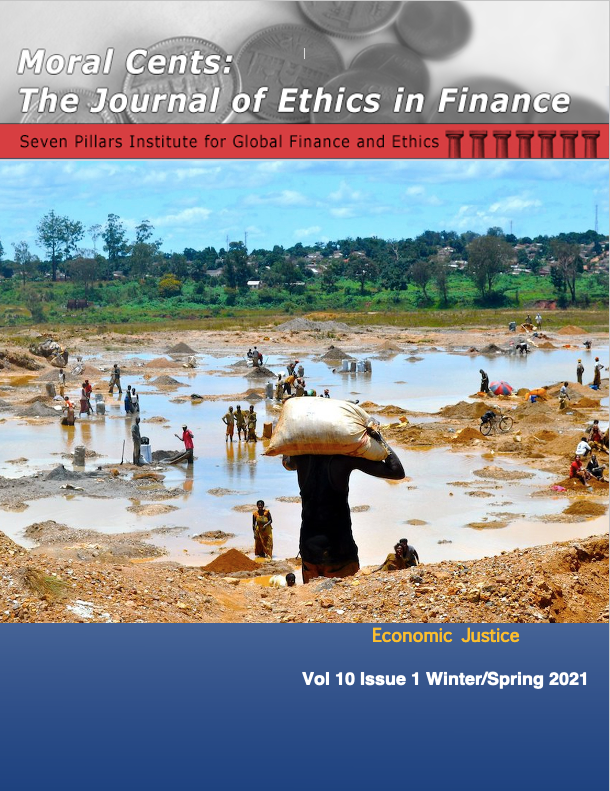Moral Cents Winter/Spring 2021

The new issue of Moral Cents: The Journal of Ethics in Finance Winter/Spring 2021 focuses on economic justice.
Now it seems economic injustice plagues us. And where there is economic injustice, invariably there are the poor. Philosophers from Immanuel Kant to Peter Singer argue reducing poverty is a moral obligation. Notably, all major religions advocate for the poor and call believers to generosity and openhandedness.
Instead of accepting the poor will always be with us and therefore, sit idly by, we should instead understand the moral imperative to alleviate economic injustice and thus help the poor. The articles in this issue tackle different problems of economic injustice encountered around the world and propose solutions.
In “The Case for Tax-Based Reparations: Norwegian EVs and Congolese Miners”, Piotr Schulkes notes more than half of new cars sold in Norway are electric and all new cars sold in the country will be electric by 2025. This success story would not be possible without cobalt sourced from the Democratic Republic of Congo. Environmental degradation, extensive human rights abuses, and corruption are norms in cobalt-mining provinces. Schulkes argues Norway is uniquely situated to remedy these problems. A small “ethics tax” on EVs sold in Norway would raise substantial funds to pay for social systems in the hardest hit areas of the DRC.
In “China’s Informal Economy: Ethical, Economic, and Empowerment Considerations”, Solveig Baylor describes how many rural borrowers have been excluded from the formal financial sector, forcing them towards unregulated and potentially exploitative lenders. Rural women struggle for financial security when facing formal sector obstacles and China’s patriarchal customs. Solutions may be as simple as including women’s names on bank loans. A policy prescription to increase inclusion of the rural poor into the formal financial sector is to reduce collateral requirements, replacing them with individual reputation and community trust.
In “Financial Solidarity: Ethics of the EU’s Financial Response to the Coronavirus Pandemic”, Violeta Perea Rubio argues the EU has progressed towards greater fiscal union in its response to pandemic related economic hardship. Due to the gravity of the pandemic, for the first time in EU history the EC has taken on mutualized debt. The EU demonstrated financial collective sovereignty through the mutualized debt solution, securing the natural rights of the collective EU citizen whilst simultaneously respecting the socio-political sovereignty of each individual member state. Rubio concludes that big steps were taken towards greater ethical financial solidarity in the EU.
In “Why Some Countries are Rich While Others are Poor” Dallin Overstreet reminds us that while many policy makers and governments across the globe have attempted to address wealth inequality, the gap continues to widen between wealthy and poor nations. Overstreet points to studies that demonstrate (1) an abundance of trade and (2) the presence of strong institutions, are powerful predictors of good economic development in countries throughout the world. Institutions include those bodies that ensure justice is served in the social, political, and economic realms. For instance, a muscular anti-trust government agency would prevent monopolies from dominating the economy. Data suggest that countries with strong institutions have limited amounts of corruption and higher levels of economic justice.
